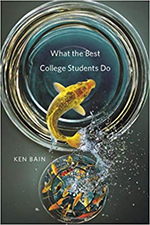 Periodically, the administrators at my college will buy a lot of copies of a particular book, and then distribute them to the faculty as a way of sharing a useful resource or message. Generally, I find that I have other more urgent ways to spend my reading time: books about astronomy or rocks or ancient life or politics or philosophy. But this semester there are a couple of new variables that led me to open Ken Bain’s What the Best College Students Do. One is that I’ve gotten familiar with some educational research about study strategies – which are effective and which are a waste of time, and I’m communicating that to my students in hopes they will get more out of my classes. Also, for the first time I’m trying my hand at teaching a college skills class for freshmen, and so this title attracted me as a source of potential lessons for that course. This book is a sequel of sorts to a previous volume called What the Best College Teachers Do, which I reckon I’ll have to read next.
Periodically, the administrators at my college will buy a lot of copies of a particular book, and then distribute them to the faculty as a way of sharing a useful resource or message. Generally, I find that I have other more urgent ways to spend my reading time: books about astronomy or rocks or ancient life or politics or philosophy. But this semester there are a couple of new variables that led me to open Ken Bain’s What the Best College Students Do. One is that I’ve gotten familiar with some educational research about study strategies – which are effective and which are a waste of time, and I’m communicating that to my students in hopes they will get more out of my classes. Also, for the first time I’m trying my hand at teaching a college skills class for freshmen, and so this title attracted me as a source of potential lessons for that course. This book is a sequel of sorts to a previous volume called What the Best College Teachers Do, which I reckon I’ll have to read next.
So what’s it all about? It’s basically a series of profiles of people who took charge of their learning, sharing their stories. It also includes nice readable summaries of empirical educational research studies that examine specific aspects of learning. Bain interviews Stephen Colbert and Neil Tyson, as well as MacArthur fellows, philanthropists, and innovators in many realms. The common thread is that these highly successful people found their inspiration, and let that guide a creative, engaged learning process, rather than seeking good grades or a compelling transcript. Attitude is key, in other words, as well as a conception of intelligence as an expandable commodity, rather than fixed state. They took risks and learned from their mistakes. They meta-cognitively embrace education as an athlete would train their body. Muscles aren’t fixed – they can be strengthened with exercise and training; and the successful exemplars in Bain’s book took a similar tack with developing their minds. Follow your deep curiosity, Bain advises, and find problems that need solving. Your mind can be expanded, and your value to the world will be enhanced if you realize your potential can peak if you work at it.
As a life-long learner, I found the book to be moderately inspiring, but not quite in the realm of “life-changing.” I wonder if a younger person might feel differently.
